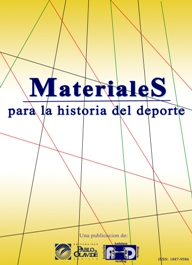El rugby amateur en la Inglaterra del s XIX: ¿filosofía o manipulación social?
Parole chiave:
profesionalismo, Grecia, deporte, sociología, historia.Abstract
El 27 de Agosto de 1995, Vernon Pugh, presidente de la comisión de la International Rugby Board (IRB) para el amateurismo, declaró que el Rugby pasaba a ser un deporte libre 1. Se terminaba de esta forma con más de un siglo de amateurismo declarado en este deporte, y se terminaba también con una década de debates sobre el conocido shamateurismo, o profesionalismo encubierto, en el cual los jugadores no cobraban por jugar pero si por el trabajo, ya fuera real o ficticio, que le proporciona el club que defendían. En ese año, terminaba el anacronismo de un deporte de finales del S.XX sometido a reglas de la Inglaterra victoriana. ¿Como se pudo llegar a dicha situación? Dunning y Sheard2 argumentan que el fenómeno del amateurismo en el Rugby en el S.XIX fue un instrumento de diferenciación social complejo y que debe ser analizado desde un punto de vista histórico y sociopolítico. En esta línea, Bádenas3 expone que la aristocracia británica del S. XIX utilizó el interés creciente por la cultura griega antigua para atribuir unos valores al deporte practicado en aquella época de forma que se conceptualizó el deporte como una actividad lúdica propia de una élite social. Para lograrlo, ensalzaron los valores de un deporte amateur griego (que no existió como tal concepto) y realzaron aquellos textos que criticaban la profesionalización de los deportistas y sus efectos sobre el deporte. Teóricos británicos, como Mahaffy4 atribuían al deporte griego antiguo unos valores que coincidían con el prototipo de gentlemen deportista de la época victoriana.
Downloads
Riferimenti bibliografici
Bádenas, P. “El espíritu olímpico: mito moderno y realidad antigua” en In corpore sano, editado por F. García y B. Hernández. Madrid: UAM Ediciones, 2005
Baker, W.T. “William Webb Ellis and the origins of Rugby Football: The life and death of a Victorian myth”. Albion: A Quarterly Journal Concerned with British Studies. 13 (1981):117-130
Blackledge, P. “Rationalist capitalist concerns: William Cail and the Great Rugby Split of 1895”. The international journal of the history of sport, 18 (2001): 35-53
Bowen, J. “Education, ideology and the Ruling Class: Hellenism and english
public schools in the nineteenth century” en Rediscovering Hellenism editado por G.W. Clarke, Cambridge: Cambridge University Press, 1989
Chatziefstathiou, D. & Henry, I. “Hellenism and Olympism: Pierre de Coubertin and the Greek Challenge to the Early Olympic Movement”. Sport in History, 27 (2007): 24-43
Collins, T. “Amateurism and the rise of Managerialism: The case of Rugby Union, 1871-1995”. Sport in History, 30 (2010): 104-120
Curry, G., Dunning, E. & Sheard, K. “Sociological versus empiricist history: Some comments on Tony Collins’s ‘History, theory and the ‘‘civilizing process’’”. Sport in History, 26 (2006):110-123
Diem, R.D. Historia cultural del deporte. Barcelona: Bellaterra, 1984
Dunning, E.G. “Football in its early stages”. History Today, 13 (1963): 838-847
Dunning, E. & Sheard, K. Barabarians, gentlemen and players. Oxford: Martin Robertson, 1979
Gardner, P. New chapters in Greek history. London: John Murray, 1892
Gardiner, E.N. Greek athletic sports and festivals. London: McMillan, 1910
Gruneau, R. “‘Amateurism’ as a sociological problem: Some reflections inspired by Eric Dunning”. Sport in Society: Cultures, Commerce, Media, Politics, 9 (2006): 559-582
Hynes, S. The Edwardian turn of mind. NJ: Princeton University Press, 1968
Holt, R. Sport and the British. Oxford: Oxford University Press, 1989
Holt, R. “The amateur body and the middle-class man: Work, Health and Style in Victorian Britain”. Sport in History, 26 (2006): 352-369
Jenkyns, R. The Victorians and Ancient Greece. Cambridge: MA, 1980
Jolly, W. Education: Its principles and practice as developed by George Combe. Londres: McMillan, 1879
Koulouri, C. “Athleticism and antiquity: symbols and revivals in nineteenth-century Greece”. The international journal of the history of sport, 15 (1998): 142-149
Kühn, C.G. Galeni Opera Omnia, Leipzig: Teubner, 1821-1833
Le Floc´hmoan, J. La génesis de los deportes. Barcelona: Labor, 1965
Leoussi, A.S. “Nationalism and racial Hellenism in nineteenth-century England and France”. Ethnic and racial studies, 20 (1997): 42-67
Mahaffy, J.P. The silver age of the greek world. Chicago: Chicago University Press, 1906
Mewaldt, J. Galeni in Hippocratis de natura hominis commentaria tria, Leipzig: Teubner, 1914
Renson, R. “Fair play: Its origins and meanings in sport and society”. Kinesiology, 41 (2009): 5-18
Riordan, J. “Amateurism, sport and the left: Amateurism for all versus amateur elitism”. Sport in History, 26 (2006): 468-483
Rivero, A. Deporte y modernización. Madrid: Dirección General de Deportes, 2003
Solá, J. “Historia del Rugby”. Apunts, 29, (1992): 6-11
Vamplew, W. Pay up and play the game: Professional sport in Britain, 1875–1914. Cambridge: Cambridge University Press, 1988
Wallace, J. Shelley and Greece: Rethinking romantic Hellenism. Nueva York: St. Martin`s Press, 1997
Williams, P. “Battle lines on three fronts: The RFU and the lost war against professionalism”. The international journal of the history of sport, 19, (2002): 114-136
Whitney, C.W. Sporting Pilgrimage. Nueva York: Harper & Brother, 1894
Young, D. “Mens sana in corpore sano? Body and mind in Ancient Greece”. The international journal of the history of sport, 22 (2005): 22-41
Dowloads
Pubblicato
Fascicolo
Sezione
Licenza
Aquellos autores/as que tengan publicaciones con esta revista, aceptan los términos siguientes:- Los autores/as conservarán sus derechos de autor y garantizarán a la revista el derecho de primera publicación de su obra, el cuál estará simultáneamente sujeto a la Licencia de reconocimiento de Creative Commons que permite a terceros compartir la obra siempre que se indique su autor y su primera publicación esta revista.
- Los autores/as podrán adoptar otros acuerdos de licencia no exclusiva de distribución de la versión de la obra publicada (p. ej.: depositarla en un archivo telemático institucional o publicarla en un volumen monográfico) siempre que se indique la publicación inicial en esta revista.
- Se permite y recomienda a los autores/as difundir su obra a través de Internet (p. ej.: en archivos telemáticos institucionales o en su página web) antes y durante el proceso de envío, lo cual puede producir intercambios interesantes y aumentar las citas de la obra publicada. (Véase El efecto del acceso abierto).












